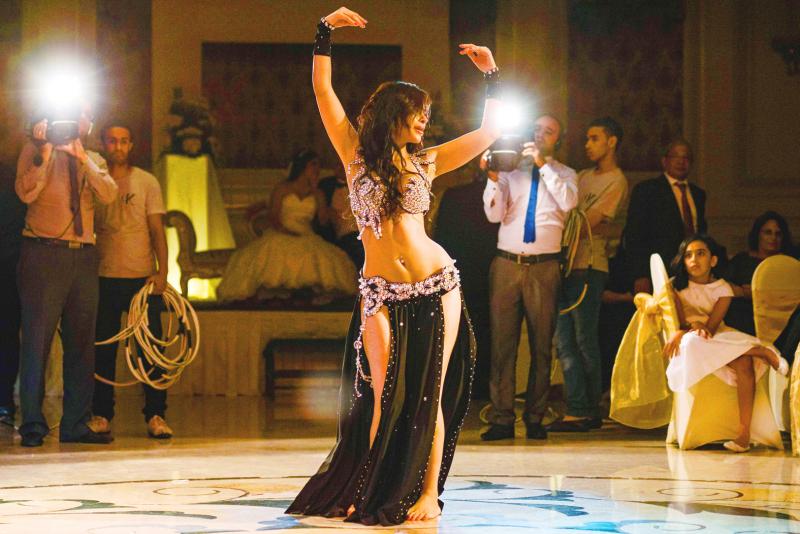At a Cairo wedding hall, Russian belly dancer Anastasia Biserova shimmied to the dance floor in a bright, high-slit skirt and an elaborately sequined bra top.
She swirled her diaphanous pink shawl and glided through the hall as a band pumped out music, while the crowd broke into rapturous applause — all captured in a video posted online.
“There is no country around the world that appreciates belly dancing like Egypt,” she said.

Photo: AFP
“Here, there is a growing trend to invite foreign belly dancers to weddings, nightclubs and other events,” she added.
Biserova moved to Cairo more than four years ago and has built a name for herself.
Belly dancers from Eastern Europe, Russia, Latin America and elsewhere have dominated the scene in the past few years in Egypt — long regarded as the birthplace of belly dancing.
However, the North African country has seen its community of homegrown dancers shrink, largely due to the profession’s increasing notoriety as the country has become more conservative over the past half-century — and to a broadening crackdown on freedoms.
The profession took a further hit as Egypt’s COVID-19 outbreak forced the temporary suspension of large weddings and the shuttering of nightclubs — although many dancers continued to enthrall audiences with online videos.
Belly dancer Maria Lurdiana Alves Tejas said it took her some time to come to terms with Egyptians’ conflicted view of her profession.
The Brazilian, known as Lurdiana, said she had performed to enthusiastic crowds at weddings and nightclubs, and had even taught at gym classes.
“But there are some who do not see me as a professional — or [who think] that I did not have a proper education and am only doing this to show my body for money,” she said. “It was very difficult and sad because I spent years learning.”
Egypt’s belly dancing scene thrived last century, when icons such as Samia Gamal and Tahya Carioca rose to fame on the silver screen.
Researchers say Egyptian society has largely seen the dance as entertainment, to be watched, but never taken up as a profession.
“This view was bolstered by popular culture, and movies which depicted belly dancers as coquettes, prostitutes or home wreckers,” said Shaza Yehia, author of a book published last year on the history of the dance.
Arabic terms for dancers — raqasat and awalem — now often bear offensive and racy connotations.
Authorities have also targeted dancers, pop divas and social media influencers who have posted videos online.
Often loosely worded charges against them have included breaching rules on “family values” or “public decency.”
Foreigners have not been spared in the crackdown. In 2018, Russian belly dancer Ekaterina Andreeva — known as Johara — was briefly arrested for donning a costume deemed too revealing, after a video of her performance circulated widely.
Yehia and other researchers have said that belly dancing in Egypt is believed to have especially flourished during the 19th century.
“Performers at the time were called awalem, or the knowledgeable, in reference to their ample knowledge in the arts of singing and dancing,” Yehia said.
Its modern-day manifestation was in part shaped by Westerners during colonial times, she added.
Some even argue that the term “belly dance,” or danse du ventre, was originally coined by the French.
“Foreign writers and painters portrayed their own fantasies about Eastern belly dancers,” Yehia said. “These views stirred imaginations in the West, which later sought to turn them into reality.”
International dance moves were incorporated into the Oriental dance, and costumes altered to appeal to popular tastes.
Now, conservatives and traditionalists view belly dancers’ gauzy skirts and glittery bra tops as too revealing, and often accuse them of being “vulgar” and “overtly sexual.”
Dancers performing to classical Arabic music have also become a rarity, instead usually preferring popular electro street music, known as mahraganat — a genre with fast beats and improvised vocals that purists view as overstepping moral boundaries.
Despite the contradictions, foreign belly dancers in Egypt say that moving to the country was the right choice.
“Foreigners have to come here to fully understand, perform and practice,” Ukrainian belly dancer Alla Kushnir said.
“Egypt is simply the land of belly dancing,” she added.

Shamans in Peru on Monday gathered for an annual New Year’s ritual where they made predictions for the year to come, including illness for US President Donald Trump and the downfall of Venezuelan President Nicolas Maduro. “The United States should prepare itself because Donald Trump will fall seriously ill,” Juan de Dios Garcia proclaimed as he gathered with other shamans on a beach in southern Lima, dressed in traditional Andean ponchos and headdresses, and sprinkling flowers on the sand. The shamans carried large posters of world leaders, over which they crossed swords and burned incense, some of which they stomped on. In this

Indonesia yesterday began enforcing its newly ratified penal code, replacing a Dutch-era criminal law that had governed the country for more than 80 years and marking a major shift in its legal landscape. Since proclaiming independence in 1945, the Southeast Asian country had continued to operate under a colonial framework widely criticized as outdated and misaligned with Indonesia’s social values. Efforts to revise the code stalled for decades as lawmakers debated how to balance human rights, religious norms and local traditions in the world’s most populous Muslim-majority nation. The 345-page Indonesian Penal Code, known as the KUHP, was passed in 2022. It

‘TRUMP’S LONG GAME’: Minnesota Governor Tim Walz said that while fraud was a serious issue, the US president was politicizing it to defund programs for Minnesotans US President Donald Trump’s administration on Tuesday said it was auditing immigration cases involving US citizens of Somalian origin to detect fraud that could lead to denaturalization, or revocation of citizenship, while also announcing a freeze of childcare funds to Minnesota and demanding an audit of some daycare centers. “Under US law, if an individual procures citizenship on a fraudulent basis, that is grounds for denaturalization,” US Department of Homeland Security Assistant Secretary Tricia McLaughlin said in a statement. Denaturalization cases are rare and can take years. About 11 cases were pursued per year between 1990 and 2017, the Immigrant Legal Resource

ANGER: US-based activists reported protests at 174 locations across the country, with at least 582 arrested and 15 killed, while Khamenei said the protesters were ‘paid’ Iran’s supreme leader on Saturday said that “rioters must be put in their place” after a week of protests that have shaken the Islamic Republic, likely giving security forces a green light to aggressively put down the demonstrations. The first comments by 86-year-old Ayatollah Ali Khamenei come as violence surrounding the demonstrations sparked by Iran’s ailing economy has killed at least 15 people, according to human rights activists. The protests show no sign of stopping and follow US President Donald Trump warning Iran on Friday that if Tehran “violently kills peaceful protesters,” the US “will come to their rescue.” While it remains